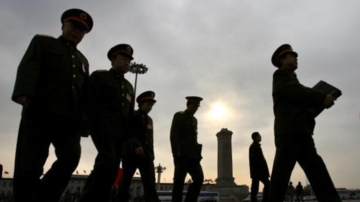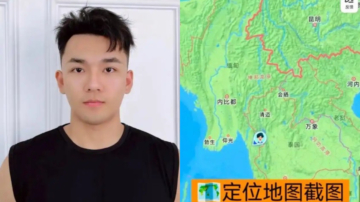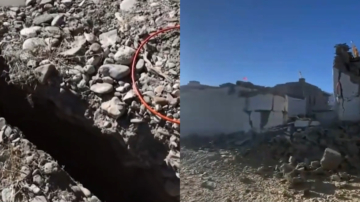【新唐人2014年05月14日訊】中共和越南日前因為西沙探油井問題,發生近百艘船艦對峙,三天內兩度百次撞擊,中方海警船還一度發射水炮。戰爭大有一觸即發之勢。不過,中國與菲律賓也因南海問題,關係在惡化。12號,菲律賓起訴此前在爭議海域內逮捕的11名中國漁民,導致南海局勢更加緊張。請看報導。
菲律賓司法部門向巴拉望公主港地方法院,以「非法盜獵」的罪名起訴了此前被抓扣的中國漁民。菲律賓方面報導說,9名中國漁民被起訴,另有2人因為未成年會被遣返。
根據菲律賓法律,他們將面臨12到20年的監禁。
這些漁民是今年5月6號,被菲律賓軍警在南沙群島半月礁附近的海域,攔截並扣留的。菲律賓聲稱,在被扣的中國漁船上發現了500只海龜,從而將這些漁民關押。
中共官媒《環球時報》說,從菲律賓目前公布的資訊來看,並沒有明顯的證據證明中國漁民捕撈海龜,更可能是這些漁民從菲律賓人手上購買了海龜。
中共官媒還說,進入2000年後,菲律賓不斷強制扣押中國漁船、逮捕漁民,背後有很濃的政治意味。一般漁民被抓後,會被要求籤一份「 認罪書」,承認「非法越界到菲律賓海域捕撈」之類的罪名,從而變相讓漁民承認菲律賓對南海海域擁有主權。
美國「紐約城市大學」政治學教授夏明指出,菲律賓通過起訴中國漁民捕捉和販賣珍稀動物海龜,有變相的對「有爭議」的領土宣佈主權的意思。
美國紐約城市大學政治學教授夏明:「對菲律賓方面,它不僅逮捕中國的船員,而且還逮捕菲律賓的公民。在這種情況下,他要起訴的話,它可以不作為領土的爭端來給中國顏色看,他可以通過基本的《國際法》。」
夏明表示,如果中國漁民被判刑的時間很長,中共就會很丟面子。下一步他們肯定要報復,南海會更不太平。
5月7號和9號,中共外交部發言人就表示,中國對包括半月礁在內的南沙群島及附近島嶼,擁有無可爭辯的主權,菲律賓方面針對中國漁民採取的任何行動,都是非法和無效的。
外交部還警告菲律賓不要再採取任何挑釁行動,要無條件放人、放船,並確保不再發生類似事情。
中共駐菲律賓使館還派遣了兩名官員前往法院斡旋,要求釋放中國漁民,並強調漁民捕魚的地點屬於中國領土。但菲律賓認為這些中國漁民是越境非法捕捉瀕危物種,因此,拒絕中方的要求。
南海是中國與世界各地取得聯繫的重要海上通道,每年大約有4萬多艘船只經過南海海域。此外,初步估算南海海底石油蘊藏量高達二百億噸。從軍事戰略上來講,控制了南海島礁,就等於直接控制了亞洲的交通要喉。
近年來,中國與菲律賓、越南和馬來西亞,在南海海域都有領土上的爭議,中方還與菲律賓發生多次衝突。
在2012年,中、菲就在南海的黃岩島對峙了一個多月﹔今年3月,菲律賓還就「中菲南海爭端」提起了國際仲裁,他們向聯合國提交了數千頁的證據。
中國最近同越南在南海也發生了接近戰爭的衝突,中共還動用了海監船和飛機。
夏明表示,中國、菲律賓和越南,他們都在用各種手段,不斷的試探對方的底牌,如何才能在領土上更多獲益。從總體上來講,南海的衝突正在加劇。
夏明:「他用非領土爭議的方式,比如用逮捕漁民走私珍稀動物方式,或者中國通過開發石油探井的方式。他們是通過小動作,想獲得一些在領土上或主權上的比較大的讓步。」
夏明指出,目前中共與整個東盟國家都有衝突,整體關係都在惡化。
採訪/陳漢 編輯/宋風 後製/陳建銘
China And The Philippines Clash Again
Recently, the Chinese Communist Party (CCP) has
clashed with The Philippines over Xisha oil exploration.
Reportedly, nearly one hundred ships were
involved in three days of repeated confrontations.
Chinese maritime police boats used water cannons,
and it is suggested that a war may be imminent.
The relationship between China and The Philippines
has also deteriorated over the South China Sea.
On March12, The Philippines prosecuted 11 Chinese
fishermen, who had been arrested in the disputed area.
This has led to increased tensions in the South China Sea.
The Filipino Judiciary charged the detained
Chinese fishermen for "illegal poaching" at
Puerto Princesa District Court of Palawan.
Reportedly, nine Chinese fishermen were
charged, and two minors will be repatriated.
Under Filipino laws, they will face 12-20 years in prison.
The fishermen were intercepted and
detained on May 6 by Filipino military police.
This took place in the waters near
the Nansha Islands Half Moon Reef.
The Philippines claimed they found 500 sea turtles
on the Chinese fishing boats, and detained the men.
China's state Global Times said that from information
published by The Philippines, there is no clear evidence
that the Chinese fishermen had caught sea turtles.
It is more likely they purchased the turtles from Filipinos.
Official state media also stated that The Philippines has
continuously detained Chinese fishing boats since 2000.
This reportedly has a very strong political overtone.
When fishermen are arrested, they will be asked
to sign a "confession" recognizing that they were
involved in "illegal fishing in Filipino waters".
This is to have the fishermen recognize The
Philippines' sovereignty over the South China Sea.
Professor Xia Ming, a political science expert
from U.S. City University in New York, points
out that The Philippines intends to announce
its sovereignty over these disputed territories.
It does so, by charging Chinese fishermen
catching and selling endangered turtles.
Xia Ming: "The Philippines not only arrested Chinese
crew members, but also citizens of The Philippines.
The prosecution can be based on "International Law",
rather than related to territorial disputes to confront China."
Xia Ming said that if the Chinese fishermen are given
a long-term sentence, the CCP will be humiliated.
Next, the CCP will certainly retaliate. The
South China Sea would see more conflict
On May 7 and May 9, a CCP Foreign Ministry spokesman
said that China has indisputable sovereignty over Nansha
Islands, including Half Moon Reef and it’s adjacent islands.
Any action from The Philippines against
Chinese fishermen are illegal and ineffective.
The CCP Foreign Ministry also warned The
Philippines not to take any provocative actions.
It also called for the unconditionally release
of the fishermen, and the return of their ships.
It also asked that The Philippines ensure
that no similar things will happen in the future.
The CCP Embassy in the Philippines
sent two officials to the court for mediation.
They demanded the fishermen be released,
and emphasized the location they were
fishing in was part of Chinese territory.
But The Philippines argues that they illegal
caught endangered species in a cross-border
area, and therefore rejected China's request.
The South China Sea is a vital sea channel
connecting China with the rest of the world.
There are more than 40,000 vessels
crossing the South China Sea each year.
In addition, preliminary estimates indicate that the South
China Sea oil reserves are as high as twenty billion tons.
From a strategic military perspective, controlling
Nansha Islands and the reefs is equivalent
to direct control of vital traffic in Asia.
In recent years, China has disputed this territory
with The Philippines, Vietnam and Malaysia.
China has had many clashes with The Philippines over this.
In 2012, the CCP and The Philippines had a confrontation
over Huangyan Island, which lasted over a month.
In March, 2014, The Philippines filed international arbitration
to the U.N., and submitted thousands of pages of evidence.
Clashes that were close to escalating war also occurred
between the CCP and Vietnam at South China Sea.
The CCP mobilized ocean surveillance ships and aircraft.
Professor Xia Ming says that China, The Philippines
and Vietnam, are using various strategies.
They are constantly testing each other,
to see how to benefit more in the territory.
Generally speaking, the South
China Sea conflict is intensifying.
Xia Ming: "They used non-territorial disputes such as
arresting fishermen smuggling endangered animals.
Or, they use China's development
of petroleum exploration wells.
They want to get relatively large concessions
on sovereignty over territory though small actions."
Xia Ming points out that the CCP has conflicts with all the
ASEAN countries, and the overall relationship is deteriorating.
Interview/Chen Han Edit/Song Feng Post-Production/Chen Jianming
菲律賓司法部門向巴拉望公主港地方法院,以「非法盜獵」的罪名起訴了此前被抓扣的中國漁民。菲律賓方面報導說,9名中國漁民被起訴,另有2人因為未成年會被遣返。
根據菲律賓法律,他們將面臨12到20年的監禁。
這些漁民是今年5月6號,被菲律賓軍警在南沙群島半月礁附近的海域,攔截並扣留的。菲律賓聲稱,在被扣的中國漁船上發現了500只海龜,從而將這些漁民關押。
中共官媒《環球時報》說,從菲律賓目前公布的資訊來看,並沒有明顯的證據證明中國漁民捕撈海龜,更可能是這些漁民從菲律賓人手上購買了海龜。
中共官媒還說,進入2000年後,菲律賓不斷強制扣押中國漁船、逮捕漁民,背後有很濃的政治意味。一般漁民被抓後,會被要求籤一份「 認罪書」,承認「非法越界到菲律賓海域捕撈」之類的罪名,從而變相讓漁民承認菲律賓對南海海域擁有主權。
美國「紐約城市大學」政治學教授夏明指出,菲律賓通過起訴中國漁民捕捉和販賣珍稀動物海龜,有變相的對「有爭議」的領土宣佈主權的意思。
美國紐約城市大學政治學教授夏明:「對菲律賓方面,它不僅逮捕中國的船員,而且還逮捕菲律賓的公民。在這種情況下,他要起訴的話,它可以不作為領土的爭端來給中國顏色看,他可以通過基本的《國際法》。」
夏明表示,如果中國漁民被判刑的時間很長,中共就會很丟面子。下一步他們肯定要報復,南海會更不太平。
5月7號和9號,中共外交部發言人就表示,中國對包括半月礁在內的南沙群島及附近島嶼,擁有無可爭辯的主權,菲律賓方面針對中國漁民採取的任何行動,都是非法和無效的。
外交部還警告菲律賓不要再採取任何挑釁行動,要無條件放人、放船,並確保不再發生類似事情。
中共駐菲律賓使館還派遣了兩名官員前往法院斡旋,要求釋放中國漁民,並強調漁民捕魚的地點屬於中國領土。但菲律賓認為這些中國漁民是越境非法捕捉瀕危物種,因此,拒絕中方的要求。
南海是中國與世界各地取得聯繫的重要海上通道,每年大約有4萬多艘船只經過南海海域。此外,初步估算南海海底石油蘊藏量高達二百億噸。從軍事戰略上來講,控制了南海島礁,就等於直接控制了亞洲的交通要喉。
近年來,中國與菲律賓、越南和馬來西亞,在南海海域都有領土上的爭議,中方還與菲律賓發生多次衝突。
在2012年,中、菲就在南海的黃岩島對峙了一個多月﹔今年3月,菲律賓還就「中菲南海爭端」提起了國際仲裁,他們向聯合國提交了數千頁的證據。
中國最近同越南在南海也發生了接近戰爭的衝突,中共還動用了海監船和飛機。
夏明表示,中國、菲律賓和越南,他們都在用各種手段,不斷的試探對方的底牌,如何才能在領土上更多獲益。從總體上來講,南海的衝突正在加劇。
夏明:「他用非領土爭議的方式,比如用逮捕漁民走私珍稀動物方式,或者中國通過開發石油探井的方式。他們是通過小動作,想獲得一些在領土上或主權上的比較大的讓步。」
夏明指出,目前中共與整個東盟國家都有衝突,整體關係都在惡化。
採訪/陳漢 編輯/宋風 後製/陳建銘
China And The Philippines Clash Again
Recently, the Chinese Communist Party (CCP) has
clashed with The Philippines over Xisha oil exploration.
Reportedly, nearly one hundred ships were
involved in three days of repeated confrontations.
Chinese maritime police boats used water cannons,
and it is suggested that a war may be imminent.
The relationship between China and The Philippines
has also deteriorated over the South China Sea.
On March12, The Philippines prosecuted 11 Chinese
fishermen, who had been arrested in the disputed area.
This has led to increased tensions in the South China Sea.
The Filipino Judiciary charged the detained
Chinese fishermen for "illegal poaching" at
Puerto Princesa District Court of Palawan.
Reportedly, nine Chinese fishermen were
charged, and two minors will be repatriated.
Under Filipino laws, they will face 12-20 years in prison.
The fishermen were intercepted and
detained on May 6 by Filipino military police.
This took place in the waters near
the Nansha Islands Half Moon Reef.
The Philippines claimed they found 500 sea turtles
on the Chinese fishing boats, and detained the men.
China's state Global Times said that from information
published by The Philippines, there is no clear evidence
that the Chinese fishermen had caught sea turtles.
It is more likely they purchased the turtles from Filipinos.
Official state media also stated that The Philippines has
continuously detained Chinese fishing boats since 2000.
This reportedly has a very strong political overtone.
When fishermen are arrested, they will be asked
to sign a "confession" recognizing that they were
involved in "illegal fishing in Filipino waters".
This is to have the fishermen recognize The
Philippines' sovereignty over the South China Sea.
Professor Xia Ming, a political science expert
from U.S. City University in New York, points
out that The Philippines intends to announce
its sovereignty over these disputed territories.
It does so, by charging Chinese fishermen
catching and selling endangered turtles.
Xia Ming: "The Philippines not only arrested Chinese
crew members, but also citizens of The Philippines.
The prosecution can be based on "International Law",
rather than related to territorial disputes to confront China."
Xia Ming said that if the Chinese fishermen are given
a long-term sentence, the CCP will be humiliated.
Next, the CCP will certainly retaliate. The
South China Sea would see more conflict
On May 7 and May 9, a CCP Foreign Ministry spokesman
said that China has indisputable sovereignty over Nansha
Islands, including Half Moon Reef and it’s adjacent islands.
Any action from The Philippines against
Chinese fishermen are illegal and ineffective.
The CCP Foreign Ministry also warned The
Philippines not to take any provocative actions.
It also called for the unconditionally release
of the fishermen, and the return of their ships.
It also asked that The Philippines ensure
that no similar things will happen in the future.
The CCP Embassy in the Philippines
sent two officials to the court for mediation.
They demanded the fishermen be released,
and emphasized the location they were
fishing in was part of Chinese territory.
But The Philippines argues that they illegal
caught endangered species in a cross-border
area, and therefore rejected China's request.
The South China Sea is a vital sea channel
connecting China with the rest of the world.
There are more than 40,000 vessels
crossing the South China Sea each year.
In addition, preliminary estimates indicate that the South
China Sea oil reserves are as high as twenty billion tons.
From a strategic military perspective, controlling
Nansha Islands and the reefs is equivalent
to direct control of vital traffic in Asia.
In recent years, China has disputed this territory
with The Philippines, Vietnam and Malaysia.
China has had many clashes with The Philippines over this.
In 2012, the CCP and The Philippines had a confrontation
over Huangyan Island, which lasted over a month.
In March, 2014, The Philippines filed international arbitration
to the U.N., and submitted thousands of pages of evidence.
Clashes that were close to escalating war also occurred
between the CCP and Vietnam at South China Sea.
The CCP mobilized ocean surveillance ships and aircraft.
Professor Xia Ming says that China, The Philippines
and Vietnam, are using various strategies.
They are constantly testing each other,
to see how to benefit more in the territory.
Generally speaking, the South
China Sea conflict is intensifying.
Xia Ming: "They used non-territorial disputes such as
arresting fishermen smuggling endangered animals.
Or, they use China's development
of petroleum exploration wells.
They want to get relatively large concessions
on sovereignty over territory though small actions."
Xia Ming points out that the CCP has conflicts with all the
ASEAN countries, and the overall relationship is deteriorating.
Interview/Chen Han Edit/Song Feng Post-Production/Chen Jianming







